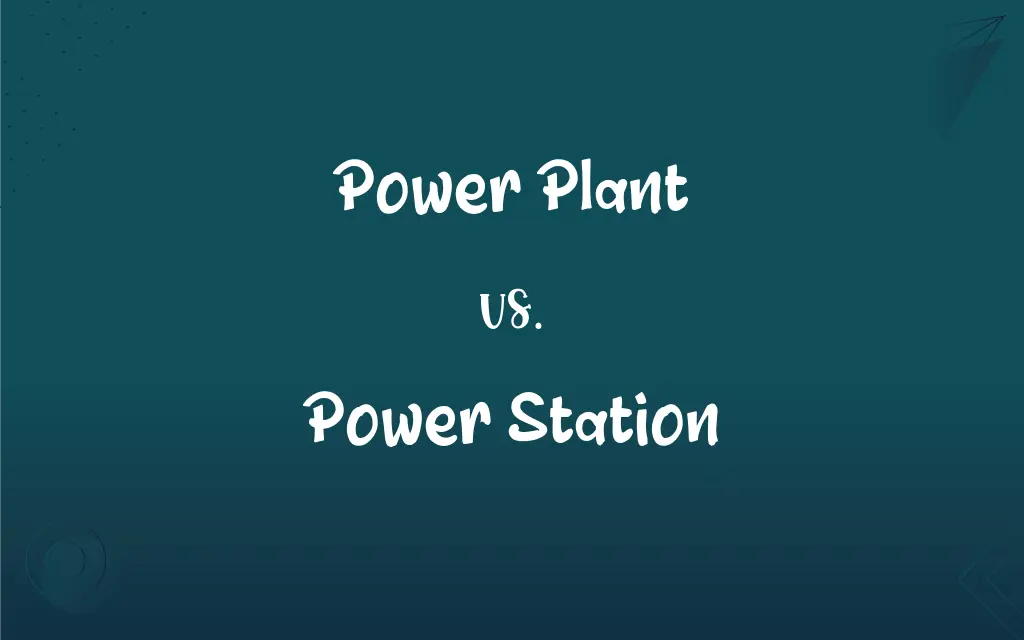Power Plant vs. Power Station: What's the Difference?
Edited by Aimie Carlson || By Harlon Moss || Published on December 8, 2023
"Power plant" and "power station" are interchangeable terms, both referring to a facility where electricity is generated and distributed.

Key Differences
A power plant is a facility where electricity is generated from sources like coal, natural gas, or renewable energy. The term power station similarly refers to such facilities. Both terms are often used interchangeably in the industry to describe the same infrastructure.
In the context of power production, a power plant typically emphasizes the machinery and equipment involved in electricity generation. On the other hand, a power station may also imply the broader infrastructure, including transformers and distribution networks.
Power plants are often distinguished by their energy source, such as nuclear power plants or solar power plants. Similarly, power stations can be classified in the same way, reflecting their primary energy source for electricity generation.
In some regions, power plant might be more commonly used, while power station is preferred in others. Despite this regional variation, both terms fundamentally describe facilities that produce electrical power.
Maintenance and operation are crucial for both power plants and power stations. Regardless of the term, these facilities play a pivotal role in meeting energy demands and maintaining grid stability.
ADVERTISEMENT
Comparison Chart
Terminology
Often refers specifically to the generation units
Can imply the entire system including distribution
Regional Usage
More common in American English
Preferred in British English
Focus
Emphasizes machinery for generation
May include broader infrastructure
Classification
Classified by energy source (e.g., nuclear power plant)
Same classification applies (e.g., nuclear power station)
Industry Context
Used interchangeably with power station
Used interchangeably with power plant
ADVERTISEMENT
Power Plant and Power Station Definitions
Power Plant
A plant where electrical energy is produced from another form of energy.
This geothermal power plant utilizes heat from beneath the earth.
Power Station
A place where mechanical energy is converted into electrical energy.
The biomass power station converts organic waste into electricity.
Power Plant
A facility for generating electric power.
The new solar power plant will provide electricity to the entire region.
Power Station
An industrial site for producing electric power.
A new wind power station has been constructed off the coast.
Power Plant
A structure housing machinery for generating electrical energy.
The hydroelectric power plant harnesses the river's energy.
Power Station
A complex of buildings and machinery for electricity generation.
The power station near the river uses hydroelectric power.
Power Plant
An industrial complex where energy is converted into electricity.
The coal-fired power plant has been operational for fifty years.
Power Station
A facility where electricity is generated and distributed.
The city's oldest power station is being upgraded to increase efficiency.
Power Plant
A set of equipment and buildings used for electricity generation.
The nuclear power plant is a key source of energy for the country.
Power Station
An establishment for electrical power production and distribution.
The power station supplies electricity to thousands of homes.
FAQs
Do power stations only use fossil fuels?
No, they can also use nuclear, hydro, or renewable sources.
What does a power station do?
It generates and distributes electricity.
What are the main components of a power plant?
Generators, turbines, and energy conversion equipment.
Can a power plant use renewable energy?
Yes, such as solar or wind energy.
Is a nuclear power plant the same as a nuclear power station?
Yes, both terms refer to a facility that generates electricity from nuclear energy.
Are power plants safe for the environment?
It depends on the energy source and technology used.
Do power stations contribute to pollution?
Some, especially those using fossil fuels, can contribute to pollution.
Can a power plant be small scale?
Yes, there are small-scale power plants for specific applications.
Do power plants create noise pollution?
Some can, especially those with large turbines or generators.
Are power stations always large?
Not necessarily, their size varies based on capacity and technology.
Are power plants and power stations the same?
Yes, they are generally interchangeable terms.
Does a power station include distribution networks?
It can, but the term primarily refers to the generation site.
Is a power station a significant source of energy?
Yes, they are crucial for large-scale electricity supply.
What is a power plant?
A facility where electricity is generated from various energy sources.
Do power stations need water?
Many require water for cooling or steam generation.
Are power plants found in urban areas?
Usually, they are located outside urban areas due to size and safety.
Can a power plant be mobile?
Some, like portable generators, can be mobile.
How does a solar power plant work?
By converting sunlight into electricity using solar panels.
What fuels can a power station use?
Various, including coal, gas, nuclear, hydro, and renewables.
What's the future of power stations?
Increasing focus on renewable energy sources and efficiency.
About Author
Written by
Harlon MossHarlon is a seasoned quality moderator and accomplished content writer for Difference Wiki. An alumnus of the prestigious University of California, he earned his degree in Computer Science. Leveraging his academic background, Harlon brings a meticulous and informed perspective to his work, ensuring content accuracy and excellence.
Edited by
Aimie CarlsonAimie Carlson, holding a master's degree in English literature, is a fervent English language enthusiast. She lends her writing talents to Difference Wiki, a prominent website that specializes in comparisons, offering readers insightful analyses that both captivate and inform.







































































